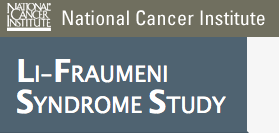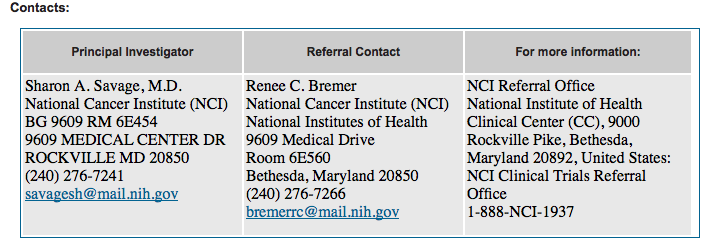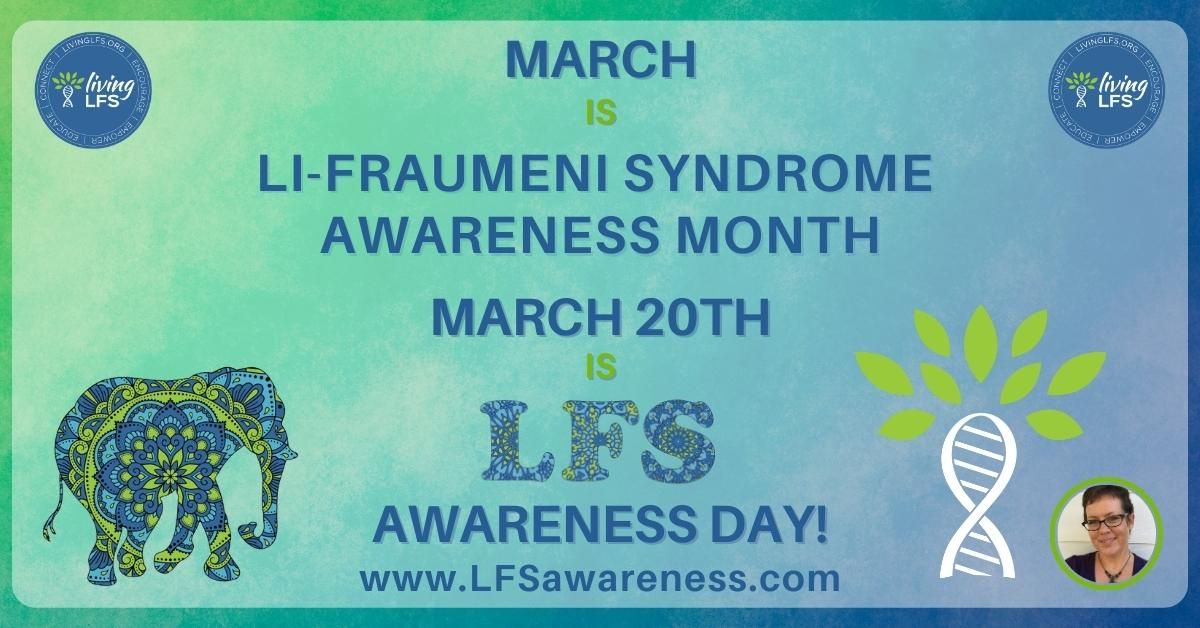The National Institutes of Health(NIH) is an agency of the United States Department of Health and Human Services. Located in Bethesda, Maryland, the NIH has been actively involved in LFS research before it was even called Li Fraumeni Syndrome. The NIH operates on a budget from Congress and uses those funds to perform research on anything and everything human health related as well as funding research grants around the US.
The National Cancer Institute(NCI) is part of the NIH and is responsible for the United States Cancer Program- which includes research on the causes, prevention and treatment of cancer. Within the NIH is the Clinical Genetics Branch(CGB) who joined forces with several prominent LFS researchers worldwide to form the Li Fraumeni Exploration Consortium(LiFE).
NIH, NCI, CGB, LiFE- what do all these letters mean for LFS? The LFS study, started in 2011 is designed to "more efficiently study the medical, genetic, psychological, and social functioning issues associated with LFS."
What does this mean? It means the NIH recognizes LFS as a health concern and despite the rarity, understand that LFSers are an important group. The NIH is looking at many different aspects of LFS, from genetics to diet. The goals of the study are pretty lofty and strive to improve the overall survival and quality of life for those with or at risk of LFS through evaluating and collecting data and specimens from this group of people.
Who can be in the Study?
The LFS Study is actively recruiting people with LFS from ages 3 to 100. If you have not had the genetic test but suspect you have the mutation, you may be eligible to participate. They are looking for those with TP53 mutations, first and second degree relatives of those with TP53 mutations, people with 3 or more primary cancers or that have had Adrenocortical carcinoma or choroid plexus tumors.
Stephanie Steinbart is the family studies referral nurse and can help determine if you can be in the study. She can be reached at 1-800-518-8474 or email stephaniesteinbart@westat.com.
Eligibility Requirements can also be found HERE
Why should you consider participating?
Standards of Care for cancer treatment are created based on scientific evidence. What started as 24 kindreds with an unusual number of cancers is now identified as a syndrome affecting hundreds of families worldwide. Those 24 original families took the time to share their medical histories, information, tissue samples and treatment. From that data, Dr.s Li and Fraumeni discovered that not only were sarcomas and breast cancer prevalent, brain tumors, leukemias and adrenal cancers also had a link to this syndrome. Just as sharing your story with another LFSer helps them to not feel alone, sharing your medical "story" with researchers can help them find better screening, treatment and prevention for our special group.
What is involved in the Study?
Many LFSers find that is takes time to get into the study. This is a tough thing since many of us feel the urgency that cancer presents. But the study itself has many different pieces and the professionals involved are very helpful in coordinating visits if required. Most LFSers will fill out questionnaires by mail. The questions are pretty simple and ask about your health history and lifestyle. This seemingly simple task requires lots of manpower hours. Another aspect of the study is collecting blood and tissue samples. Not everyone will be required to submit blood or tissue, but this can provide a lot of valuable information. In an effort to determine the best screening routines for LFSers, the NIH also is studying full body MRI and it's effectiveness for screening. Getting MRI's can be one of the great screening challenges many LFSers face. As more LFSers participate, more data is collected that shows whether to not this is effective at catching cancer early. Early studies show that it is and more studies will lead to better and more efficient Protocols that LFSers can rely on. There isn't always funding available for travel or lodging when participating in the study, so that's a cost you have to consider. Be sure to ask if there are any travel or lodging grants available.
More about Study Participation can be found HERE
Being in a study can take time and effort. With LFS, sometimes time and effort are in short supply. But in 2010, the very first Workshop for LFS researchers and patients was held at the NIH. Interaction between LFSers and those studying the syndrome are extremely important. Not only did mutants get a sense of community we had not previously known, researchers and clinicians were introduced to this amazing group. It was after this conference that the LFS Study branched off from a much bigger hereditary genetics study. By participating in studies, you are not only helping future LFSers, you become part of the team working towards a world where LFS survival and quality of life are not different than the average person's.
If you have any questions about the study- you can contact the primary clinician, Dr. Phuong Mai by phone 1-240-276-7257 or email maip@mail.nih.gov.
References
The LFS Clinical Trial - http://clinicaltrials.gov/ct2/show/NCT01443468
The LFS Study- http://lfs.cancer.gov
Goals- http://lfs.cancer.gov/goals.html
Participation- http://lfs.cancer.gov/participation.html
LFS Clinical Studies at NIH LINK HERE


